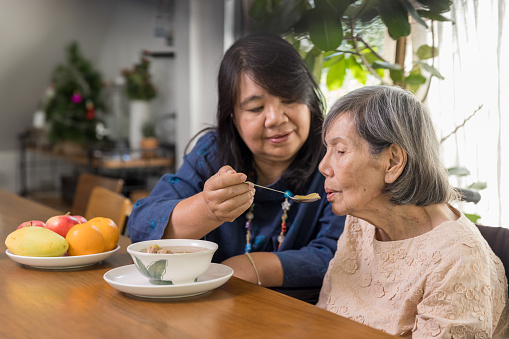Caring for someone who has dementia might take years and years. Even when Family Caregivers make an attempt to share the workload and expenses, this arrangement does not always work. There may be one member of the family who does far more than the others. There is a possibility of anger and distrust. When family members do not communicate and coordinate care for a loved one, problems can arise.
Caring for a loved one is a shared responsibility for most families. People with dementia are usually cared for by those who currently reside with them. As an example, it could be a family member. There are family members that strive to help a person if they live alone. The arrangement may shift if the care becomes more involved.
Family members who have more significant time, space, or financial resources may step in to help out. Families can divide the responsibility of caring for a loved one with dementia by taking turns caring for them. Moving from one child’s home to another is not uncommon. In a single home, a “primary family caregiver” is constantly present, while others are called upon to assist at certain times or in the event of an emergency.

Many members of a family are concerned about a loved one who has dementia. None of them may be residing in the same house. Each member of the person’s family has their own opinions about how to care for them, and the Family Caregivers are no exception. Also, they strive to divide up the work and costs.
Many families, however, do not discuss how they would divide the work and costs throughout their lives. Between family members who live near the person and those who live apart, conflicts emerge. In the following part, we’ll go over some of the most common issues.
Family feuds are a common occurrence:
In-home and out-of-home caregivers argue on who is to blame. A common source of dissatisfaction among family members who live a considerable distance away from their loved ones is the quality of care. When the live-in caregiver started making mistakes, they described what they could have done to better their care. Family Caregivers may be accused of contributing to their patients’ depression if they fail to offer enough care.
A person’s distant relatives are more critical if they haven’t had any involvement in their day-to-day care. Additionally, they may be dismissive of countries that have well-developed dementia care systems. A person’s dementia can worsen over time, and some family members may not be aware of this. They have the impression that the caregiver is stumbling and not giving it their all.

Distant relatives are also harshly criticized by in-home caretakers. Their colleagues accuse them of failing to perform their fair share of the necessary labor. They ignore what they have to say. Even worse, they may refuse to provide any information at all to the investigators.
A family member’s condition is under dispute. Family members that reside far away perceive the issue in a very different light when they visit. When a child visits, they are likely to find the individual friendly and normal. They appear anxious to converse and go out. Even the person’s live-in caretaker may be a source of annoyance. Inappropriate food, inability to go to the restroom, and a lack of outings are complaints.
As a result, this type of Family Caregivers may be seen negatively by visiting children as being rude to the individual. The person’s spouse or children feel betrayed by them. Complaints are untrue, and they know it. They are surprised and hurt by the person’s attentiveness and love for the visitors. This is because in many varieties of dementia, while memory loss occurs, social skills stay intact until later. The person becomes even more annoyed with the visitors as soon as they leave.
They know what to do to appear “normal” to guests, and they go to great lengths to do so. As a result of their exertion, the individuals become weary and difficult to manage once the guests have left.

They don’t ask for assistance:
Live-in caretakers are wary of asking for help from others. They believe that others are blaming them or aren’t willing to help. Even when they’re sick, they have no one to turn to. Live-in careers are unable to connect with their families as a result.
Family members that live far apart don’t keep in touch:
If distant family members believe they are being neglected, they may stop contact with one another. They don’t want to hear what you have to say. They may believe that the caregiver is a strict disciplinarian who tries to exclude them. Accounts are required by family members who make financial contributions, which produces a great deal of commotion.
Family members who reside far away often donate money to help out. They want the Family Caregivers to spend the money on care-related expenses, and they may inquire about its use. Expenses incurred in the course of one’s duties as a caregiver are numerous. This type of Family Caregivers cost may be viewed as excessive by the family members. Outsiders may think some expenditures are unnecessary. Some may seem unrelated to concern.

The majority of live-in caregivers do not maintain detailed financial records and feel uncomfortable being questioned about their spending habits. The distant family members feel humiliated and upset if they are asked for specifics or remark something unfavorable.
Confidence in the person’s finances and assets:
Dementia patients frequently have difficulties managing their finances or manliest. Consequently, family members assist them in managing their money, real estate, and taxation. This can lead to severe misinterpretations. It is usual for parents to grant their children power of attorney for them to be able to access the funds. After learning that one of their parent’s children plans to sell their parent’s property, saying that the money is required for a loved one’s care, the other children seize the chance to obtain a share of the earnings to their advantage. Money and property handling raise a lot of red flags in people’s minds.

Brothers and sisters’ long-standing feuds hurt care:
Resentment and resentment are common in every family. Resentment and jealousy might lead to Family Caregivers in childhood, according to these people. These problems are alleviated when the children separate and begin living alone. When the kids get together to talk about taking care of their parents, old tensions may reemerge. There is a possibility that the children’s circumstances have changed dramatically in terms of their education, financial resources, and social standing. This makes it more challenging to have an open dialogue.

Leave a Reply